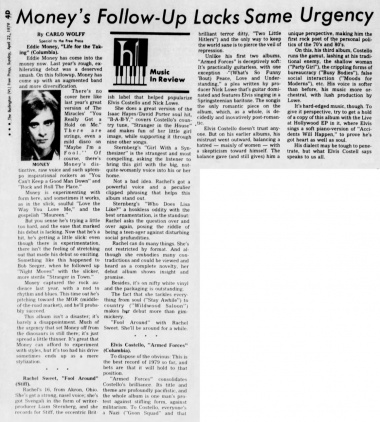Burlington Free Press, April 22, 1979: Difference between revisions
(formatting) |
(formatting +image link) |
||
| (One intermediate revision by the same user not shown) | |||
| Line 11: | Line 11: | ||
---- | ---- | ||
{{Bibliography text}} | {{Bibliography text}} | ||
To dispose of the obvious: This is the best record of 1979 so far, and bets are that it will hold to that position. | To dispose of the obvious: This is the best record of 1979 so far, and bets are that it will hold to that position. | ||
| Line 18: | Line 17: | ||
To Costello, everyone's a Nazi ("Goon Squad" and that brilliant terror ditty, "Two Little Hitlers") and the only way to keep the world sane is to pierce the veil of repression. | To Costello, everyone's a Nazi ("Goon Squad" and that brilliant terror ditty, "Two Little Hitlers") and the only way to keep the world sane is to pierce the veil of repression. | ||
Unlike his first two albums, ''Armed Forces'' is deceptively soft: It's practically guitarless, with one exception | Unlike his first two albums, ''Armed Forces'' is deceptively soft: It's practically guitarless, with one exception — "(What's So Funny 'Bout) Peace, Love and Understanding," a plea written by producer Nick Lowe that's guitar dominated and features Elvis singing in a Springsteenian baritone. The song is the only romantic piece on the album, which, as a whole, is decidedly and innovatively post-romantic. | ||
Elvis Costello doesn't trust anyone. But on his earlier albums, his mistrust went outward, balancing a hatred mainly of women with a skepticism toward himself. The balance gave (and still gives) him a unique perspective, making him the first rock poet of the personal politics of the 70's and 80's. | Elvis Costello doesn't trust anyone. But on his earlier albums, his mistrust went outward, balancing a hatred mainly of women with a skepticism toward himself. The balance gave (and still gives) him a unique perspective, making him the first rock poet of the personal politics of the 70's and 80's. | ||
| Line 32: | Line 31: | ||
{{cx}} | {{cx}} | ||
{{Bibliography notes header}} | |||
{{Bibliography notes}} | |||
'''Burlington Free Press, April 22, 1979 | |||
---- | |||
[[Carlo Wolff]] reviews ''[[Armed Forces]]'' and Rachel Sweet's ''[[Rachel Sweet: Fool Around|Fool Around]]''. | |||
{{Bibliography images}} | |||
[[image:1979-04-22 Burlington Free Press page 4D clipping 01.jpg|380px|border]] | |||
<br><small>Clipping.</small> | |||
{{Bibliography box}} | |||
<center><h3> Fool Around </h3></center> | <center><h3> Fool Around </h3></center> | ||
<center>''' Rachel Sweet </center> | <center>''' Rachel Sweet </center> | ||
| Line 51: | Line 63: | ||
Rachel can do many things. She's not restricted by format. And although she embodies many contradictions and could be viewed and heard as a complete novelty, her debut album shows insight and promise. | Rachel can do many things. She's not restricted by format. And although she embodies many contradictions and could be viewed and heard as a complete novelty, her debut album shows insight and promise. | ||
Besides, it's on nifty white vinyl and the packaging is outstanding. The fact that she tackles everything from soul ("Stay Awhile") to country ("Wildwood Saloon") makes | Besides, it's on nifty white vinyl and the packaging is outstanding. The fact that she tackles everything from soul ("Stay Awhile") to country ("Wildwood Saloon") makes her debut more than gimmickry. ''Fool Around'' with Rachel Sweet. She'll be around for a while. | ||
{{cx}} | |||
{{cx}} | {{cx}} | ||
<small>Page scan.</small><br> | |||
[[image:1979-04-22 Burlington Free Press page 4D.jpg|x120px|border]] | [[image:1979-04-22 Burlington Free Press page 4D.jpg|x120px|border]] | ||
{{Bibliography notes footer}} | {{Bibliography notes footer}} | ||
| Line 74: | Line 80: | ||
*[http://www.burlingtonfreepress.com/ BurlingtonFreePress.com] | *[http://www.burlingtonfreepress.com/ BurlingtonFreePress.com] | ||
*[https://en.wikipedia.org/wiki/The_Burlington_Free_Press Wikipedia: The Burlington Free Press] | *[https://en.wikipedia.org/wiki/The_Burlington_Free_Press Wikipedia: The Burlington Free Press] | ||
<!-- | <!-- 200055539 --> | ||
--> | |||
{{DEFAULTSORT:Burlington Free Press 1979-04-22}} | {{DEFAULTSORT:Burlington Free Press 1979-04-22}} | ||
Latest revision as of 01:10, 16 July 2019
|

